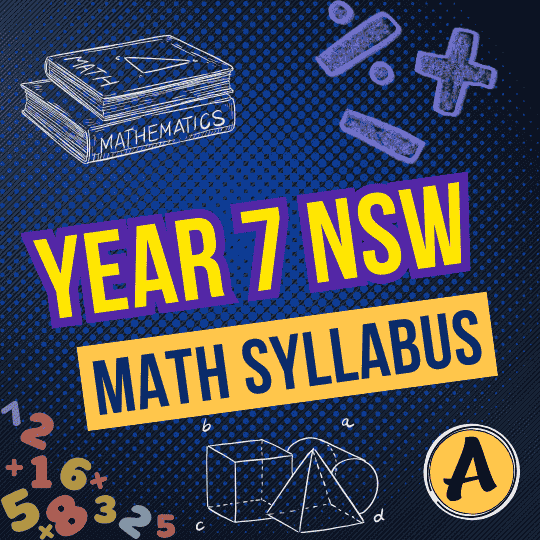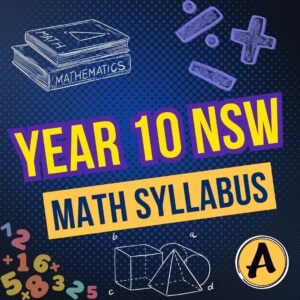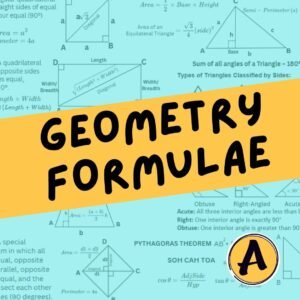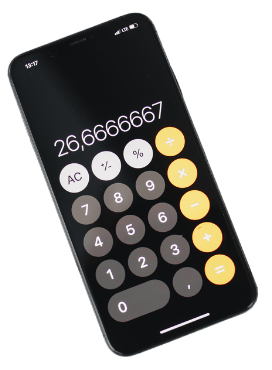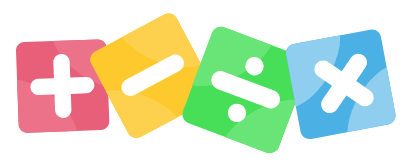Year 7 Maths NSW Curriculum Topics
The Year 7 Maths NSW Syllabus is the start of high school maths. It introduces key Stage 4 topics like integers, fractions, decimals, percentages, algebra, geometry, graphs, data and probability. With steady practice, students build a strong foundation for Years 8–10.
Term-wise Breakdown – Year 7 Maths NSW Syllabus
Term 1
Integers • Indices • Linear Relationships
Computation with Integers
- Compare and order integers
- Add, subtract, multiply, and divide positive and negative integers
- Apply all four operations confidently
External: MathsIsFun (Negative Numbers) · Khan Academy (Arithmetic Practice)
Indices
- Use index notation (powers, prime factorisation)
- Explore square roots and cube roots
Internal: Indices Guide
External: Khan Academy (Exponents & Roots)
Linear Relationships (Intro)
- Plot and identify points on the Cartesian plane
- Plot simple linear relationships
Internal: Number Plane – Complete Guide ·
Number Line Maths Game
External: Khan Academy (Coordinate Plane)
Term 2
Algebra • Fractions/Decimals/Percentages
Algebraic Techniques
- Pronumerals as symbols for numbers
- Form and evaluate expressions (substitution)
- Apply arithmetic laws to algebraic terms
- Use distributive law to expand expressions
Internal: Algebra Made Easy ·
Substitution Practice ·
BODMAS Guide
External: Khan Academy (Algebra Basics)
Fractions, Decimals & Percentages
- Compare fractions and find equivalence
- Round decimals to required accuracy
- Terminating vs recurring decimals
- Convert between fractions, decimals, and percentages
- Add/subtract/multiply/divide fractions and decimals
- Introduction to irrational numbers (basic understanding)
Internal: Basics of Fractions ·
Add/Subtract Fractions ·
Multiply/Divide Fractions ·
Fractions ↔ Decimals ·
Percentages Made Easy
External: Khan Academy (Fractions)
Term 3
Equations • Angles • Shapes
Equations
- Solve one- and two-step linear equations
- Verify solutions by substitution
- Introduction to quadratic equations (simple cases)
Internal: Linear Equations Practice ·
Parabola (Quadratics Intro)
External: Purplemath (Solving Linear Equations)
Angle Relationships
- Geometric notation and conventions
- Angles at a point; corresponding/alternate/co-interior angles
- Parallel lines, transversals, and reasoning-based angle problems
External: MathsIsFun (Angles in Parallel Lines)
Properties of Geometric Figures
- Classify triangles and quadrilaterals
- Apply properties to solve problems
Internal: Triangles & Quadrilaterals Guide
Term 4
Data • Measurement • Area • Probability
Data Classification & Visualisation
- Numerical (discrete/continuous) vs categorical (nominal/ordinal)
- Represent data using graphs and charts
External: BBC Bitesize (Data Handling)
Data Analysis
- Mean, median, mode, range
- Interpret results and make conclusions
External: Math Planet (Statistics)
Length & Circles
- Perimeter of quadrilaterals and composite shapes
- Circle properties and features
Internal: Geometry Formulae
External: MathsIsFun (Circles)
Area
- Formulas for rectangles, triangles, parallelograms
- Area of circles and sectors (intro)
External: MathsIsFun (Area)
Probability
- Probabilities of chance experiments
- Complementary events
Internal: Probability Guide
External: MathsIsFun (Probability)
Understanding the Year 7 Maths NSW Syllabus Topics
Year 7 marks the beginning of high school in NSW. Maths becomes more structured and detailed, covering a wide range of skills—integers, algebra, geometry, graphs, data, and probability. Some areas may feel challenging at first, but the syllabus is designed to build knowledge step by step.
NSW Mathematics Stage Classification
In NSW, Year 7 belongs to Stage 4 (Years 7–8). Stage 4 sets the foundation for Stage 5 (Years 9–10) and prepares students for senior mathematics and the HSC.
Assessment in Year 7 (Typical)
- Term 1: Integers & Linear Relationships
- Term 2: Algebra & Fractions
- Term 3: Equations & Geometry
- Term 4: Data, Probability & Measurement
Skills Developed in Year 7 Maths
- Logical problem-solving
- Algebraic reasoning
- Geometric thinking
- Data analysis and probability awareness
- Preparation for Year 7 NAPLAN-style skills
Related Resources
Internal (Aussie Math Tutor NSW)
Trusted External (Authority Links)
Conclusion
The Year 7 Maths NSW Syllabus provides a strong foundation for Stage 5 maths. It covers a wide range of topics that prepare students for more advanced concepts in high school. While some parts may feel hard initially, consistent practice and clear support help every student succeed.
If you’d like tailored resources or practice tests for your child, explore: Free Practice Quizzes and our Year 7 Tutoring Support.
FAQs for Year 7 Maths NSW Syllabus
Is Year 7 Maths Hard?
Year 7 Maths can feel hard at first because it introduces many new topics that students are not used to handling. Students deal with topics such as Number Plane, Algebra, Fractions, Decimals, Like terms, Equations, Angles, Parallel Lines, Percentages, and Probability.
If a student’s basics in addition, subtraction, multiplication, or division are weak, these gaps can make learning new concepts more difficult.
However, with regular practice and support, most students adapt well and gain confidence over time.
Do Year 7 students do algebra?
Yes! In Year 7 Maths, students learn about pronumerals, like terms, substitution, linear equations with one unknown, expanding brackets, and word problems.
What is the hardest topic in Year 7 maths?
Many students find algebra and fractions/decimals challenging. The hardest part of fractions is often adding and subtracting them, as well as simplifying them. Some students also struggle with the number plane and percentages.
When should I consider getting a tutor for my Year 7 child?
Many parents notice early red flags when their child begins to struggle with maths. From our experience, the most common warning signs include:
Not knowing which topics they are studying
Simply copying work from the board without understanding
Consistently scoring lower marks than usual
Becoming upset or even crying when faced with maths tasks
Avoiding maths topics whenever possible
Losing confidence in their abilities
Struggling with basic operations (addition, subtraction, multiplication, division)
In more serious cases, falling 1–2 years behind the rest of the class
These struggles often build up quietly, but with early support and intervention—such as targeted tutoring—students can regain confidence, close gaps, and get back on track.
Is Year 7 maths harder than Year 6?
Yes, because it introduces more formal algebra and abstract reasoning, but the progression is gradual.
What are the Assessments for Year 7 NSW students?
Term 1: Integers & Linear Relationships
Term 2: Algebra & Fractions
Term 3: Equations & Geometry
Term 4: Data, Probability & Measurement
What math level should a 12-year-old be in?
A 12-year-old is generally in Year 7. Students in Year 7 should confidently handle fractions, decimals, percentages, and basic equations. The syllabus ensures they reach this level.
How can everyday activities reinforce Year 7 Maths concepts?
Instead of teaching maths only as theory or “schoolwork,” it’s more effective to show students how maths is used in everyday life. Practical examples make learning meaningful. For instance, students can:
Calculate fares and choose time-efficient routes to school or the park
Use ratios while cooking recipes
Create a budget for chocolates or treats
Track fitness data such as steps, distance, or calories
These real-world activities not only make maths more engaging but also help students understand why it matters.
What are the best online tools or resources for Year 7 Maths practice?
There are many platforms that provide quizzes, interactive lessons, worksheets, and practical examples aligned with the NSW curriculum. One of the most trusted resources is Aussie Math Tutor NSW, which combines official NSW textbooks, past exam papers, NAPLAN material, thorough research, and expert input from NSW syllabus specialists to create high-quality learning resources.

